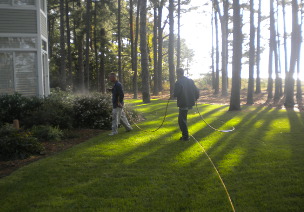

In May of 2006, I was bitten by a tick. A weekend trip to the beach was cut short to rush back home to my doctor's office. I left his office and was sent straight to the hospital. I spent several days there, hooked up to an IV, full of antibiotics.
Apparently, I was one of the fortunate ones. Although I didn't see the doctor until a severe infection developed, I actually recovered.
At this point in life, I'm almost as functional as ever. However, the course of antibiotics I took still leaves me extremely tired when I overdo things. Although I didn't develop Lyme Disease or Rocky Mountain Spotted Fever, my allergic reaction is just another way that the bite of a very tiny parasite (ticks are not insects) can devastate the human body.
 Over the years, as I worked out of doors, I was very vigilant about checking myself for ticks, especially in warm weather. However, this bite occurred during a cool spell back in April. At the time, I wasn't even thinking that ticks might be active.
Over the years, as I worked out of doors, I was very vigilant about checking myself for ticks, especially in warm weather. However, this bite occurred during a cool spell back in April. At the time, I wasn't even thinking that ticks might be active.
Due to the warm winters of recent years, apparently ticks did not die off as usual. Experts are predicting that insects will continue to be prolific. I believe I picked up the tick while walking around a client's property to review his projects. The property has a wooded lot and an area full of tall grasses, which is generally nirvana for ticks.
I've done a lot of research about ticks lately, especially on the internet and there's a wealth of information there. I would like to take this opportunity to ask you to be especially vigilant for ticks. I thought I knew the proper procedures for dealing with them, but perhaps a short refresher may help you recognize the warning signs.
There are over 850 species of ticks world-wide. Most tick bites are harmless and don't require medical treatment. However, once bitten, you need to remove the tick as soon as possible.
The following steps should be followed, if you find a tick on yourself:
- Remove the tick promptly and carefully.
- Use tweezers to grasp the tick near its head or mouth and pull gently to remove the whole tick.
- Do not twist it or the head may remain buried.
- If possible, seal it in a jar and keep for a week or two, just in case there is a problem and your doctor needs to examine it.
- Use soap and water to wash your hands and the area around the tick bite after handling the tick.
- Call your doctor if you aren't able to remove the tick or if you develop a fever, headache, joint pains or symptoms of paralysis.
- Please be sure to take special care when being outdoors.